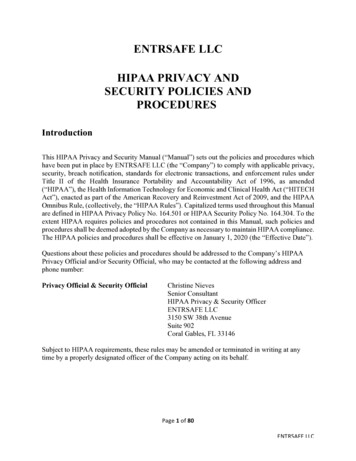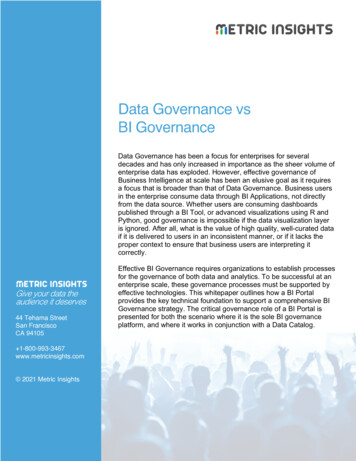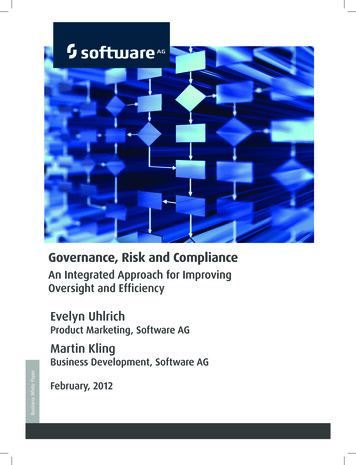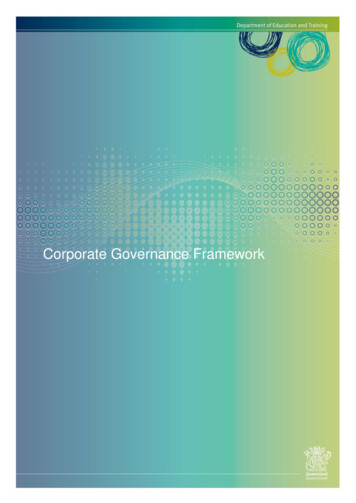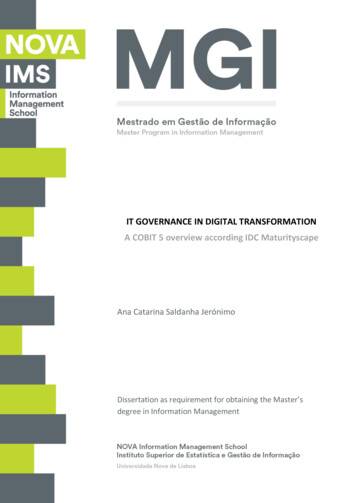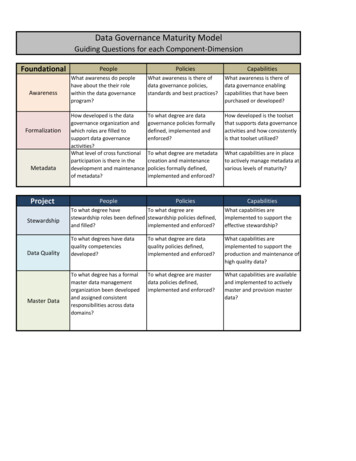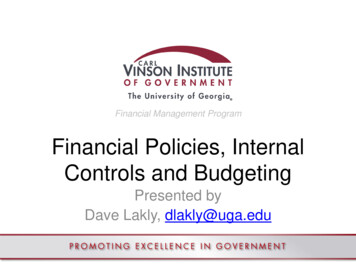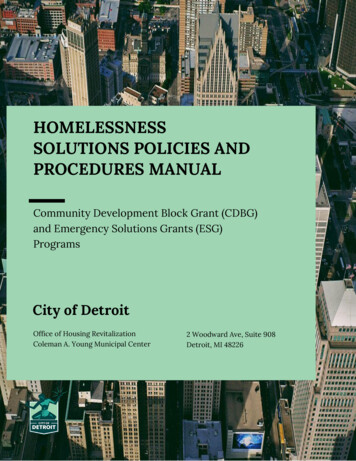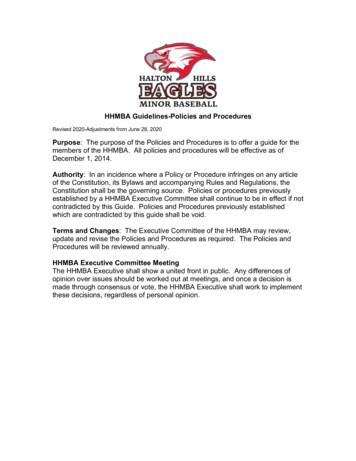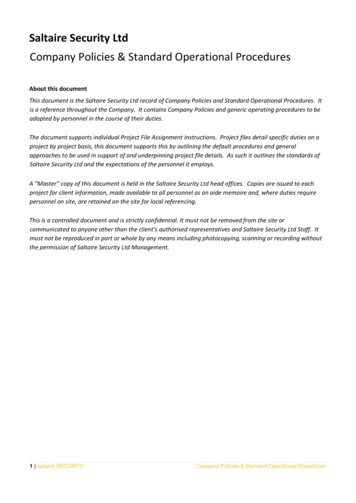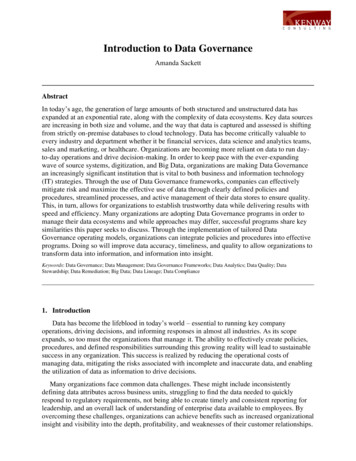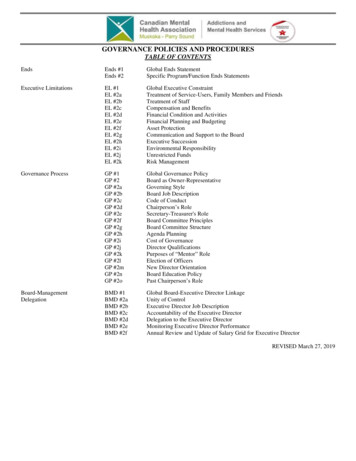
Transcription
GOVERNANCE POLICIES AND PROCEDURESTABLE OF CONTENTSEndsEnds #1Ends #2Global Ends StatementSpecific Program/Function Ends StatementsExecutive LimitationsEL #1EL #2aEL #2bEL #2cEL #2dEL #2eEL #2fEL #2gEL #2hEL #2iEL #2jEL #2kGlobal Executive ConstraintTreatment of Service-Users, Family Members and FriendsTreatment of StaffCompensation and BenefitsFinancial Condition and ActivitiesFinancial Planning and BudgetingAsset ProtectionCommunication and Support to the BoardExecutive SuccessionEnvironmental ResponsibilityUnrestricted FundsRisk ManagementGovernance ProcessGP #1GP #2GP #2aGP #2bGP #2cGP #2dGP #2eGP #2fGP #2gGP #2hGP #2iGP #2jGP #2kGP #2lGP #2mGP #2nGP #2oGlobal Governance PolicyBoard as Owner-RepresentativeGoverning StyleBoard Job DescriptionCode of ConductChairperson’s RoleSecretary-Treasurer's RoleBoard Committee PrinciplesBoard Committee StructureAgenda PlanningCost of GovernanceDirector QualificationsPurposes of “Mentor” RoleElection of OfficersNew Director OrientationBoard Education PolicyPast Chairperson’s RoleBoard-ManagementDelegationBMD #1BMD #2aBMD #2bBMD #2cBMD #2dBMD #2eBMD #2fGlobal Board-Executive Director LinkageUnity of ControlExecutive Director Job DescriptionAccountability of the Executive DirectorDelegation to the Executive DirectorMonitoring Executive Director PerformanceAnnual Review and Update of Salary Grid for Executive DirectorREVISED March 27, 2019
ENDS #1POLICY TYPE:POLICY TITLE:ENDSGLOBAL ENDS STATEMENTCanadian Mental Health Association, Muskoka-Parry Sound Branch is committed to hope and recovery through integrated mentalhealth and addiction services. Using effective, safe innovative partnerships and practices, we provide the highest quality treatment,support, education and advocacy for the people of Muskoka-Parry Sound.REVISED April 21, 2021
ENDS #2POLICY TYPE:ENDSPOLICY TITLE:SPECIFIC PROGRAM/FUNCTION ENDS STATEMENTSThe global ends of the service shall be met through the activity of its various programs and/or functions. The ends of theseprograms/functions are as follows:The End Statements below were approved in their entirety at a Board meeting held January 20, 2021.DEVELOPMENTAL DISABILITIESAdult Protective Services ProgramAssist adults with developmental disabilities to achieve optimal quality of life, independence, and social inclusion.Dual Diagnosis Court Case ManagementSupport individual with developmental disabilities to be diverted from justice system by accessing health and community services.MENTAL HEALTH PROGRAMSAssertive Community Treatment TeamLong-term intensive mental health supports assist adults to meet individual needs and improve quality of life.Early InterventionReduce negative impact of psychosis through intervention in early stages of illness.Crisis InterventionReturn to pre-crisis level of functioning.Diversion and Court SupportAssist individuals with mental illness who are in the justice system to be diverted and access mental health supports.Psychogeriatric/SeniorsProvide assessment and support for individuals with age related concerns and mental illness to maintain functioning.Counselling and TreatmentBrief to long-term therapy for individuals with mental illness to reduce symptoms and improve functioning.CASE MANAGEMENT MENTAL HEALTHIntensive Case ManagementLong-term community support to assist adults with severe mental illness to meet individual needs.Transitional Case ManagementBrief to longer term support to adults with mental illness to meet individual needs.Housing Case ManagementSupport to individuals to maintain adequate housing where mental health puts them at risk of homelessness.Regional Dual DiagnosisSupport individuals with developmental disabilities and mental illness to meet individual needs.Court Dual DiagnosisIntensive support for individuals with developmental disabilities and severe mental illness to meet needs.CASE MANAGEMENT ADDICTIONSOpioid Rapid Access Addiction Medicine (Muskoka)Rapid access to addiction medicine and follow-up to improve aspects of recovery from alcohol or opioid addiction.Opioid Treatment Early ChildhoodSupport for pregnant and parenting individuals to reduce harm associated with addictionOpioid Treatment - Methadone MaintenanceSupport clients of methadone maintenance program through case management to improve aspects of recovery.
Pre Housing – AddictionsSupport clients who are not adequately housed to prepare for success in housing programAddiction Supportive HousingSupport individuals to sustain adequate housing where addiction puts them at risk of homelessnessADDICTION TREATMENTAdult TreatmentSupport individuals in recovery from addiction through counselling, groups, and alleviation of symptomsElementary School TreatmentProvide education, support and counselling to students at risk of substance abuse.Addiction TherapySupport individuals in recovery from addiction through counselling, groups, and alleviation of symptomsProblem GamblingReduce Harm associated with problem gamblingDrug AwarenessProvide public awareness to reduce potential substance abuseYouth AddictionsProvide counselling and education to youth who are using substances or at risk of usingB’SAANIBAMAADSIWINB'Saani Community DevelopmentTo respond to mental health needs of communities and their members.B'Saani CrisisTo return to pre-crisis level of functioning.B'Saani Counselling and TreatmentIndividual, group counselling, and psycho-education to reduce severity of symptoms and improve functioningB'Saani AddictionReduce harm associated with substance use including support and referralB’Saani Community Withdrawal Management ServicesSupport individuals to successfully withdraw from substance abuse in a minimally intrusive home and community environmentCONSUMER INITITATIVESFamily InitiativeProvide opportunities for family members to participate in group and individual support and education.Peer InitiativePeer support of recovery provides opportunity for social experiences, relationships, and vocational skill buildingOTHERPartner Assault ProgramProvide education groups for offenders referred from justice system related to partner assaultREVISED January 19, 2022EL#1POLICY TYPE:POLICY TITLE:EXECUTIVE LIMITATIONSGLOBAL EXECUTIVE CONSTRAINT
The Executive Director shall not cause or allow any practice, activity, decision, or circumstance which is either unlawful, imprudent,or in violation of commonly accepted business and professional ethics and practices.REVISED March 27, 2019
EL #2aPOLICY TYPE:POLICY TITLE:EXECUTIVE LIMITATIONSTREATMENT OF SERVICE-USERS, FAMILY MEMBERS AND FRIENDSWith respect to interactions with service-users or those applying to be service-users, family members and friends, the ExecutiveDirector shall not cause or allow conditions, procedures, or decisions which are unsafe, untimely, disrespectful, unduly undignified,unnecessarily intrusive, which fail to provide appropriate confidentiality and privacy, or which fail to be caring, non-judgmental,open and professional.Accordingly, the Executive Director will not:(1)(2)(4)(5)allow planning, development and delivery of services which does not involve service-users, family members andcommunities whenever appropriateuse methods of collecting, usage, and disclosure of service-user information that fails to protect against improper access ofthe information. This includes the operation of facilities or environment that fails to protect the privacy of service-users.maintain facilities without appropriate accessibility and safety for service usersallow service-users, family and others to be unaware of what to expect from the services offered or to be unaware of how tovoice complaints, or concerns if they feel they have not been provided reasonable protection under this policyREVISED March 27, 2019
EL #2bPOLICY TYPE:POLICY TITLE:EXECUTIVE LIMITATIONSTREATMENT OF STAFFWith respect to treatment of paid and volunteer staff, the Executive Director shall not cause or allow conditions which are unfair,undignified, disorganized, or unsafe.Accordingly, the Executive Director will not:(1)(2)(3)(4)(5)(6)(7)(8)operate without written personnel policies and procedures, which provide for effective handling of grievances, and whichprotect against wrongful conditions, such as nepotism and grossly preferential treatment for personal reasons;retaliate against any staff member for non-disruptive expression of dissent;prevent staff from grieving to the Board when:(a)internal grievance procedures have been exhausted; and(b)the employee alleges either:(i)that Board policy has been violated to his or her detriment; or(ii)that Board policy does not adequately protect his or her human rights;allow staff with their protections under this policy;employ staff without a job description or contract; and periodic performance appraisals;allow staff to be unprepared to deal with emergency situations;operate without adequate policies and procedures which protect the health and safety of staff and volunteers includingpsychological health and safetyallow staff to lack resources such as appropriate space and equipment to perform their duties.REVISED March 27, 2019
EL #2cPOLICY TYPE:POLICY TITLE:EXECUTIVE LIMITATIONSCOMPENSATION AND BENEFITSWith respect to employment, compensation, and benefits to employees, consultants, contract workers, and volunteers, the ExecutiveDirector shall not cause or allow jeopardy to fiscal integrity or public image.Accordingly, the Executive Director will not:(1)(2)(3)(4)change his or her own benefits; except as those benefits are consistent with a package for all other employees;promise or imply employment that cannot be terminated;establish current compensation and benefits which deviates materially from the geographic or professional market for theskills employed; orcreate obligations over a longer term greater than revenue can be safely projected, or which are not subject to continuedfunding.REVISED March 27, 2019
EL #2dPOLICY TYPE:POLICY TITLE:EXECUTIVE LIMITATIONSFINANCIAL CONDITION & ACTIVITIESWith respect to the actual, ongoing condition of the organization's financial health, the Executive Director shall not cause or allow thedevelopment of fiscal jeopardy.Accordingly, the Executive Director will end more funds than have been received in the fiscal year to date;indebt the organization in an amount greater than can be repaid by certain, otherwise unencumbered revenues within 60 days;access undesignated funds accumulated in previous fiscal years in excess of approved amounts;conduct interfund shifting in amounts greater than can be restored to a condition of discrete fund balances by certain,otherwise unencumbered revenue within 30 days;prevent payroll and debts to be settled in a timely manner;allow tax payments or other government-ordered payments or filings to be overdue or inaccurately filed;make a single capital purchase of greater than 10,000;acquire, encumber or dispose of real property;fail to aggressively pursue receivables after a reasonable grace period;allow commitment for new leases that, over the term of the lease, exceed an annual increase greater than the increase in theConsumer Price Index for Ontario, or 4%;allow funds, which are not required for immediate use, to be invested in a manner which violatesgovernment directives, unnecessarily exposes the funds to risk, or fails to provide a competitive rate of return;allow purchases to be performed in a way that leads to the personal benefit of an employee or Director, but to the detrimentof the organization;fail to utilize resources in an efficient mannerREVISED April 21, 2021
EL #2ePOLICY TYPE:POLICY TITLE:EXECUTIVE LIMITATIONSFINANCIAL PLANNING AND BUDGETINGFinancial planning for any fiscal year or the remaining part of any fiscal year shall not deviate materially from Board Ends priorities,risk fiscal jeopardy, or fail to show a generally acceptable level of foresight.Accordingly, the Executive Director will not cause or allow budgeting which:(1)(2)(3)(4)(5)(6)risks incurring those situations or conditions described as unacceptable in the Board policy “Financial Condition andActivities” (Policy EL #2d);contains too little information to enable credible projection of revenues and realistic projection of expenses;fails to separate capital and operational items;plans the expenditure in any fiscal year of more funds than are conservatively projected to be received in that period; orprovides less for Board prerogatives during the year than is set forth in the Cost of Governance Policy (GP #2i)does not consider the impact on quality, safety and client experienceREVISED April 21, 2021
EL #2fPOLICY TYPE:POLICY TITLE:EXECUTIVE LIMITATIONSASSET PROTECTIONThe Executive Director shall not allow assets to be unprotected, inadequately maintained nor unnecessarily risked.Accordingly, the Executive Director will not:(1)(2)(3)(4)(5)(6)(7)(8)(9)allow the organization to be uninsured against theft, fire, fraud and casualty losses to a prudent replacement value and againstliability losses to Directors, staff, volunteers and the organization itself in an amount greater than the average for comparableorganizations;allow conditions that subject plant and equipment to improper wear and tear or insufficient maintenance;unnecessarily expose the organization, its Board, staff or volunteers to claims of liability;receive, process or disburse funds under controls which are insufficient to meet the Board-appointed auditor’s standards;make any purchase:(a) wherein normally prudent protection has not been given against conflict of interest;(b) of over 2500.00 without having obtained comparative prices and quality; or(c) of over 5,000.00 without a method of assuring the balance of long-term quality and cost;allow property, information and files to be exposed to loss, improper access or significant damage;accept or solicit funds from tobacco, alcohol companies or from the proceeds of gambling.endanger the organization's public image or credibility; orcompromise the independence of the Board’s audit or other external monitoring or advice, such as by engaging partiesalready chosen by the Board as consultants or advisors.REVISED March 27, 2019
EL #2gPOLICY TYPE: EXECUTIVE LIMITATIONSPOLICY TITLE: COMMUNICATION AND SUPPORT TO THE BOARDThe Executive Director shall not permit the Board to be uninformed or unsupported in its work.Accordingly, the Executive Director will not:(1)neglect to submit monitoring data required by the Board (see policy on Monitoring Executive Performance BMD #2e) in atimely, accurate and understandable fashion; directly addressing provisions of the Board policies being monitored;(2)allow the Board to be unaware of fail to provide the Board with a monitoring report in May providing sufficient detail toallow the Board to complete the Declaration of Compliance, which it has to submit and post (within 90 days of the agency’sfiscal year end, i.e., in June) as a requirement of the Multi-Sector Service Accountability Agreement; or(3)allow the Board to be unaware or fail to inform the Board of any failure to meet obligations in contracts with other funders.(4)let the Board be unaware of relevant trends, anticipated adverse media coverage, threatened or pending lawsuits, materialexternal and internal changes; particularly changes in the assumptions upon which a Board policy has been previouslyestablished;(5)allow the Board to be unaware if, in the Executive Director’s opinion, the Board is not in compliance with its own policies inGovernances Process and Board-Management Delegation, particularly in the case of Board behaviour which is detrimental tothe work relationship between the Board and Executive Director;(6)allow the Board to be without decision information required periodically by the Board or let the Board be unaware of relevanttrends;(7)present information in unnecessarily complex or lengthy form, or in a form that fails to differentiate among information of 3types: monitoring, decision preparation, and other;(8)allow the Board to be without an approved communications plan;(7)favour or privilege certain Board members over others or fail to deal with the Board as a whole except when (a) fulfillingindividual requests for information, or (b) responding to officers or committees duly charged by the Board;(8)allow the Board to be unaware of an actual or anticipated non-compliance with any policy of the Board; or(9)fail to supply for the consent agenda all items delegated to the Executive Director; yet required by law or contract to beBoard-approved, accompanied by the corresponding monitoring assurance.(10)allow the Board Chairperson to be unsupported in producing each Board meeting agenda to be posted on the agency’s Boardportal website two weeks prior to a regularly scheduled Board meeting with the following exception. The Board meetingscheduled for the month of June will require an agenda posted to the Board portal website a one week prior to the Boardmeeting. Attachments related to the Board meeting agenda may be posted up until 3 days prior to the Board meetingfollowing which that item will be deferred to the next regularly scheduled meeting.REVISED March 27, 2019
EL #2hPOLICY TYPE:POLICY TITLE:EXECUTIVE LIMITATIONSEXECUTIVE SUCCESSIONIn order to protect the Board from the sudden loss of Executive Director’s services, the Executive Director shall not operate withoutat least one individual familiar with Board and Executive Director issues and procedures, who could temporarily assume the role ofExecutive Director. In addition, the Executive Director shall not operate without an explicit line of temporary emergency succession.In the case of a planned departure by the Executive Director:With the support of the Executive Director and the Manager of Human Resources and Administration, the Board will seek areplacement for the Executive Director following, in as far as it applies, agency policies and procedures.In the case of an unplanned vacancy of the Executive Director position:(1)(2)the designated alternate for the Executive Director will assume the role on an acting basis(This individual will have to enter into a Performance Agreement as required by the Multi-Sector Service AccountabilityAgreement. The Board, with the assistance of the Manager of Human Resources and Administration, will develop aPerformance Agreement using the one in effect under the previous Executive Director as a guide or template); andwith the support of the Manager of Human Resources and Administration the Board will seek a replacement for theExecutive Director following, in as far as it applies, agency policies and e Executive Director will ensure that the Manager of Human Resources and Administration maintains an active and up-to-date fileon Executive Succession including the most current version of Marty, Dick, et al, Recruiting A Health Care CEO: The DefinitiveGuide For Boards. Ottawa: CHA Press and the sample CEO Employment Contract from an online seminar entitled Role of BoardMembers and CEO Relationships.REVISED March 23, 2022
EL #2iPOLICY TYPE: EXECUTIVE LIMITATIONSPOLICY TITLE: ENVIRONMENTAL RESPONSIBILITYWith respect to the environment, the Executive Director shall not fail to take action to reduce any negative impact the organizationmay have.Accordingly, the Executive Director will not:(1)(2)(3)(4)(5)allow unnecessary use of motor vehicles;allow unnecessary energy to be consumed by agency facilities;make purchases without considering means to minimize their negative environmental impact;operate without appropriate use of, local recycling programs; orinvest in environmentally unethical financial vehicles.REVISED March 27, 2019
EL #2jPOLICY TYPE: EXECUTIVE LIMITATIONSPOLICY TITLE: UNRESTRICTED FUNDSThe Executive Director shall not use any unrestricted funds and allow the Board to be unaware of any change in the unrestrictedfunds of which they should be aware.Accordingly, the Executive Director will not:1.Allow unrestricted to be non-interest bearing;2.spend and provide accounting of, as part of the budgeting for the fiscal year, an amount greater than 10% of the total amount ofunrestricted funds as of March 31st of the previous fiscal year;3.Fail to ensure a there is a minimum balance in the unrestricted funds account of 5% of the agency’s annual budget of the previousfiscal year.4.Fail to inform the Board of Directors of expenditures of the unrestricted funds over and above the amount set forth in item 2.Reviewed: March 23, 2022
EL #2kPOLICY TYPE: EXECUTIVE LIMITATIONSPOLICY TITLE: RISK MANAGEMENTThe Executive Director shall not fail to maintain a risk management process and to notify the Board, in a timely manner, of any risksof which they should be aware. Accordingly, the Executive Director will not:(1) fail to notify the Board, in a timely manner, of any “ moderate or serious risk of impact on the achievement of the MultiSector Service Accountability Agreement”; [in order for the Board to meet its obligation to report same to Ontario Health(Central) formerly North Simcoe Muskoka Local Health Integration Network].REVIEWED MARCH 23, 2022
GP #1POLICY TYPE: GOVERNANCE PROCESSPOLICY TYPE: GLOBAL GOVERNANCE POLICYThe purpose of the Board is to:(1) Represent the interests of the moral ownership, defined as the people of Muskoka and Parry Sound. The Board will proactivelypursue ownership input, not waiting for input to be initiated by owners;(2) Determine the benefits that the organization will provide, keeping a long term, strategic perspective, (the Ends policies) and;(3) Ensure that the operating organization accomplishes what it should (described in the Ends policies) in ways that the Boarddetermines are acceptable (described in the Executive Limitations policies).REVIEWED June 25, 2021
GP #2POLICY TYPE: GOVERNANCE PROCESSPOLICY TITLE: BOARD AS OWNER-REPRESENTATIVEThe Board, as a group, represents the ownership interest of the organization.Accordingly:(1)(2)although Directors are drawn from particular groups and/or geographic areas, they must distinguishbetween the interests of the ownership as a whole and the interests of the group or geographic area and must advance theformer even when it conflicts with the latter; andDirectors’ ethical obligation is to represent the entire ownership, not specifically the organizations or geographic areas fromwhich they are drawn, and therefore;(a) appropriate broad-based input from the moral ownership must be sought and assimilated; and(b) the full range of the views of the moral ownership as to purpose and cost of the organization must be incorporated intoBoard deliberations, not just those points of view held personally by Directors.REVIEWED September 15, 2021
GP #2aPOLICY TYPE: GOVERNANCE PROCESSPOLICY TITLE: GOVERNING STYLEThe Board will govern lawfully, observing the principles of the Policy Governance model, with an emphasis on (a) outward visionrather than on internal preoccupation, (b) encouragement of diversity in viewpoints, (c) strategic leadership more than administrativedetail, (d) clear distinction of Board and executive roles, (e) collective rather than individual decision, (f) future rather than past orpresent, and (g) proactivity rather than reactivity.Accordingly:(1)the Board will cultivate a sense of group responsibility. The Board, not the staff, will be responsible for excellence ingoverning. The Board will be the initiator of policy, not merely a reactor to staff initiatives. The Board will not use theexpertise of individual members to substitute for the judgement of the Board, although the expertise of individual membersmay be used to enhance the understanding of the Board as a body;(2)the Board will direct, control, and inspire the organization through the careful establishment of broad written policiesreflecting the Board's values and perspectives. The Board's major policy focus will be on the intended long-term impactsoutside the staff organization, not on the administrative or programmatic means of attaining those effects;(3)the Board will enforce upon itself whatever discipline is needed to govern with excellence. Discipline will apply to matterssuch as attendance, preparation for meetings, policy-making principles, respect of roles, and ensuring the continuance ofgovernance capability. Although the Board can change its governance process policies at any time, it will scrupulouslyobserve those currently in force;(4)continual Board development will include orientation of new Directors in the Board's governance process and periodic Boarddiscussion of process improvement;(5)the Board will allow no officer, individual, or committee of the Board to hinder or be an excuse for not fulfilling groupobligations;(6)the Board will monitor and discuss the Board's process and performance at each meeting. Self-monitoring will includecomparison of Board activity and discipline to policies in the Governance Process and Board-Management Delegationcategories.REVIEWED March 23, 2022
GP #2bPOLICY TYPE: GOVERNANCE PROCESSPOLICY TITLE: BOARD JOB DESCRIPTIONSpecific job outputs of the Board, as an informed agent of the ownership, are those that ensure appropriate organizationalperformance.Accordingly, the Board will provide:(1)(2)(3)(4)(5)authoritative linkage between the ownership and the operational organization; andwritten governing policies that realistically, address the broadest levels of all organizational decisions and situations:(a)Ends: organizational impacts, benefits, outcomes, recipients; beneficiaries, impacted groups; and their relative worthin cost or priority;(b)Executive Limitations: constraints on executive authority that establish the prudence and ethics boundaries withinwhich all executive activity and decisions must take place;(c)Governance Process: specification of how the Board conceives, carries out and monitors its own task;(d)Board-Management Delegation: how power is delegated and its proper use monitored; the Executive Director role,authority, and accountability;assurance of successful organizational performance on Ends and Executive Limitations;operational decisions not delegated to the Executive Director; andsystemic advocacy on behalf of the organization for adequate funding and government policy consistent with our values,visions and mission.REVEWED March 23, 2022
GP #2cPOLICY TYPE: GOVERNANCE PROCESSPOLICY TITLE: CODE OF CONDUCTThe Board commits itself and its members to ethical, businesslike and lawful conduct, including proper use of authority andappropriate decorum when acting as Directors. The following also applies, whenever appropriate, to all offices of the corporation,whether they are Directors or not. Ethical dilemmas will be resolved using the Ethics Framework.Accordingly:(1)members must have loyalty to the ownership, unconflicted by loyalties to staff, other organizations, and any personal interestas a consumer;(2)members must avoid potential, actual and perceived conflicts of interest with respect to their fiduciary responsibility, andtherefore:(a) there must be no self-dealing or business by a member with the organization. Members will annually disclose theirinvolvements with other organizations, with vendors, or any association that might be or might reasonably be seenas being a conflict;(b) when the Board is to decide upon an issue about which a member has an unavoidable conflict of interest, thatmember shall withdraw without comment not only from the vote, but also from the deliberation;(c) Directors must not use their Board positions to obtain employment in the organization for themselves, familymembers or close associates. A Director who applies for employment must first resign from the Board;(d) a Director is viewed as automatically being in a conflict of interest and should not be involved in debate, lobbying orvoting on a personnel issue specific to a staff member who is directly serving or has directly served that Director ora close relative or friend of that Director; and(3)Directors may not attempt to exercise individual authority over the organization and therefore: Members’ interaction with theExecutive Director or with staff must recognize the lack of authority vested in individuals except when explicitly Boardauthorized;(a) members’ interaction with public, press or other entities must recognize the same limitation and the inability of anyDirector to speak for the Board except to repeat explicitly stated Board decisions;(b) except for participation in Board deliberation about whether the Executive Director has achieved any reasonableinterpretation of Board policy, members will not express individual judgments of performance of employees or theExecutive Director;(c) Board member interaction with the Executive Director and other staff within the organization must be directlyrelated to matters pertaining to the Board. If a Board member has operational concerns, these concerns are to bevetted by the Board Chair, and if deemed appropriate, the Board chair will bring the concerns to the Board meeting.If warranted, the Executive Director will prepare a report within an appropriate time frame. Requests for directinspection should be requested by the Board Chair at a Board meeting.(4)members will respect the confidentiality appropriate to issues of a sensitive nature;(5)members will be properly prepared for Board deliberation;(6)members will support the legitimacy and authority of the final determination of the Board on any matter, irrespective of themember’s personal position on the issue;(7)members may make an annual financial contribution to the agency during the first quarter of the Board year (between thebeginning of June and the end of August). The amount donated by individual members will be treated as confidentialinformation;(8)the Board will determine how to deal with violati
Provide education, support and counselling to students at risk of substance abuse. Addiction Therapy Support individuals in recovery from addiction through counselling, groups, and alleviation of symptoms Problem Gambling Reduce Harm associated with problem gambling Drug Awareness Provide public awareness to reduce potential substance abuse

